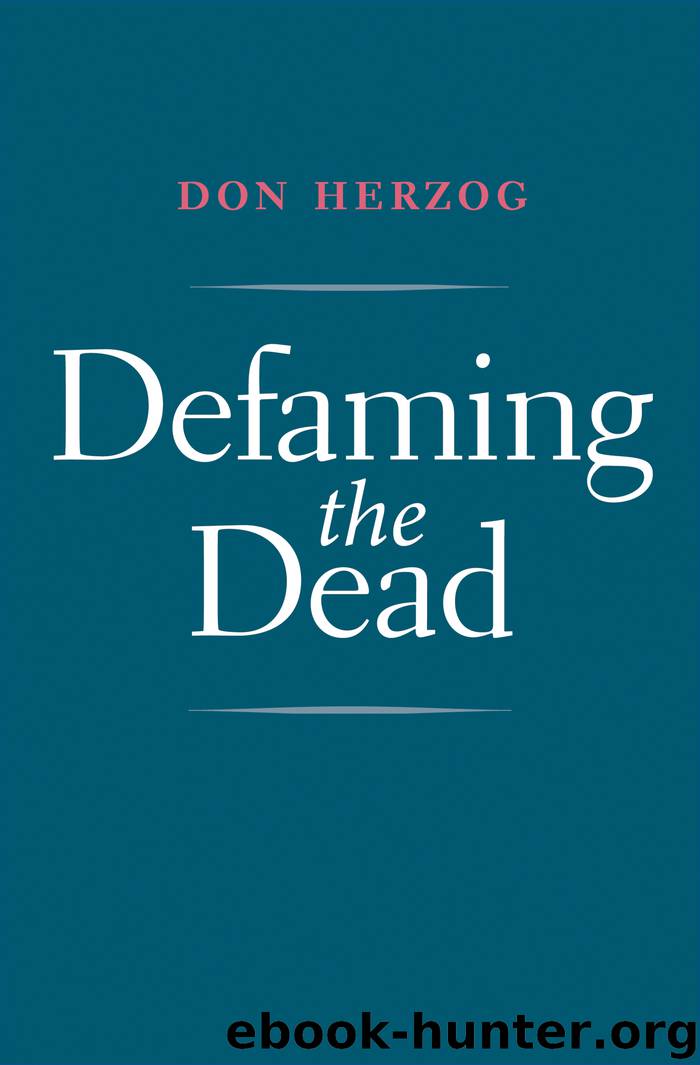Defaming the Dead by Don Herzog

Author:Don Herzog
Language: eng
Format: epub
Publisher: Yale University Press
Published: 2017-04-07T04:00:00+00:00
Coda
Let’s review: here’s the chapter by buzzword. Scandalum magnatum: the law once took an interest in defaming the dead, when they were great men, anyway. But that was criminal law, not tort law. So the injury that counted was that to the public. Archbishop Whitgift might die, but the Church of England and the realm lived forever. I don’t want to resurrect scandalum magnatum—American First Amendment law rightly rejects it—but I’m not interested in making it a crime to defame the dead. I’m defending a remedy in tort.
Actio personalis cum moritur: a personal action dies with the death of the person. In the common law, a defamation lawsuit would terminate when either plaintiff or defendant died. So a fortiori, it wasn’t a tort to defame the dead. Palsgraf principle: a wrong to one party that harms but does not wrong a second isn’t a tort against the second. No wonder actions brought by aggrieved descendants of dead ones who’ve been libeled founder. We could treat the survivors as the wronged parties: then the Palsgraf principle would pose no obstacle. Doing so would in some sense hold defamers accountable and in some sense offer compensation. Close enough, perhaps, if you think tort law is all about deterrence and compensation. But not close enough, if like me you think it matters enormously that a tort plaintiff says, and must say, to a defendant, “you wronged me”: and if in turn you want to redeem the intuition that it wrongs the dead to defame them. Or even if you’re paying attention to just which injuries should be compensated.
These two obstacles have explanatory, not justificatory, force. They provide an account of why libeling the dead is a nonstarter in modern tort law. But they don’t give us good reason to embrace that fact. Actio personalis depends most plausibly on the thought that tort prevents private violence. But we may rightly seek to hold people accountable for their wrongs without beginning to believe that if we don’t, feuds will erupt. And the Palsgraf principle is compatible too with thinking that defaming the dead wrongs them. It is far-fetched, remember, to muster the oblivion thesis and urge that there are no post-humous legal interests, period. That position is far more revisionist, far more radical, against current law than any cause of action I’m recommending here would be.
1. Smith v. Dameron, 12 Va. Cir. 105, 107 (1987).
2. Casamasina v. Worcester Tel. & Gazette, Inc., 2 Mass. App. Ct. 801, 802 (1974).
3. Restatement (Second) of Torts, § 560.
4. Gugliuzza v. KCMC, 606 So.2d 790, 791 (La. 1992); see too Perez v. McCormick & Co., 693 So.2d 294 (La. 1997).
5. “Francis Bacon,” Edinburgh Review (July 1837): 12, reprinted with incidental variations in Thomas Babington Macaulay, Critical and Historical Essays, Contributed to the Edinburgh Review, 5th ed., 3 vols. (London, 1848), 2:296.
6. BL Add. MS 38139, fol. 58r. I’ve followed the meticulous account in Alastair Bellany, “A Poem on the Archbishop’s Hearse: Puritanism, Libel, and Sedition after the Hampton Court Conference,” Journal of British Studies (April 1995).
Download
This site does not store any files on its server. We only index and link to content provided by other sites. Please contact the content providers to delete copyright contents if any and email us, we'll remove relevant links or contents immediately.
The Social Psychology of Inequality by Unknown(2312)
The Plant Paradox by Dr. Steven R. Gundry M.D(2041)
The Writing on the Wall by Anselm Jappe(1759)
Working for Yourself by J.D. (Nolo) Stephen Fishman(1478)
Every Landlord's Legal Guide by Janet Portman & Stewart Marcia & Ralph Warner(1325)
The First 20 Hours: How to Learn Anything ... Fast by Kaufman Josh(1304)
ADHD on Trial by Michael Gordon(1241)
Decisive by Chip Heath(1201)
Drafting Contracts: How and Why Lawyers Do What They Do, Second Edition by Stark Tina L(1173)
Working for Yourself by Stephen Fishman J.D. (Nolo)(1139)
The Economist Aug 8th 2015 by The Economist(1123)
Restitution by Restitution(1115)
The Economist Aug 29th 2015 by The Economist(1098)
A Practical Guide to International Arbitration in London by Hilary Heilbron(1085)
The Lord of the Rings: The Fellowship of the Ring, the Two Towers, the Return of the King by J. R. R. Tolkien(1083)
Intellectual Property Strategy by John Palfrey(1082)
Collusion by Luke Harding(1045)
Persuasion by Owner(1013)
Chapter 1 by Owner(950)
